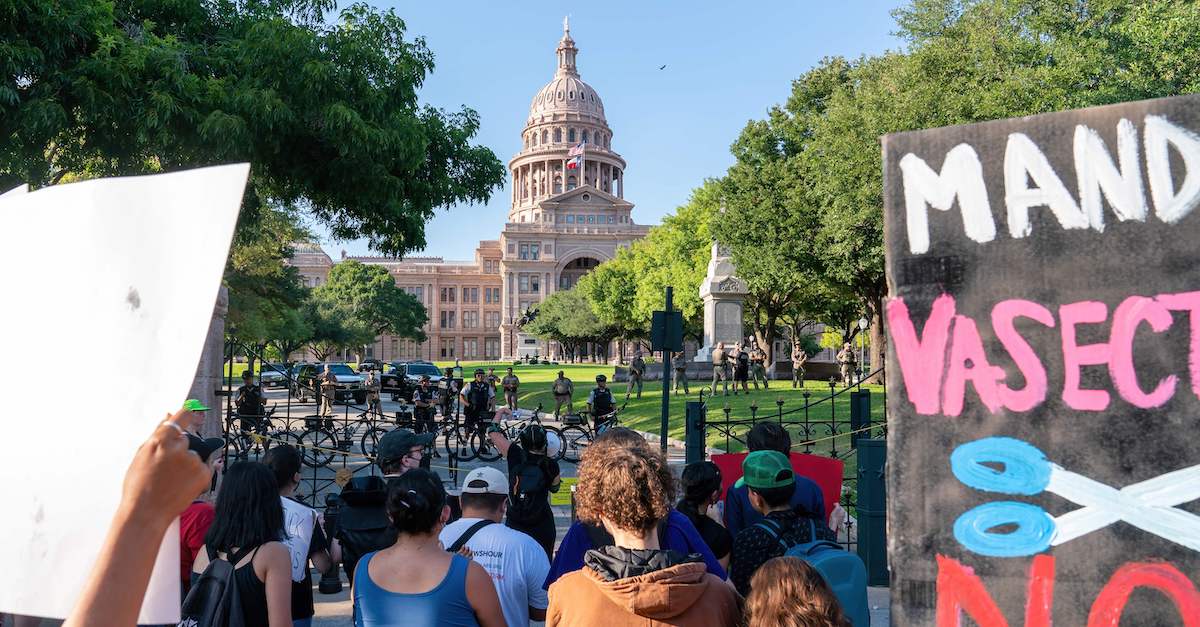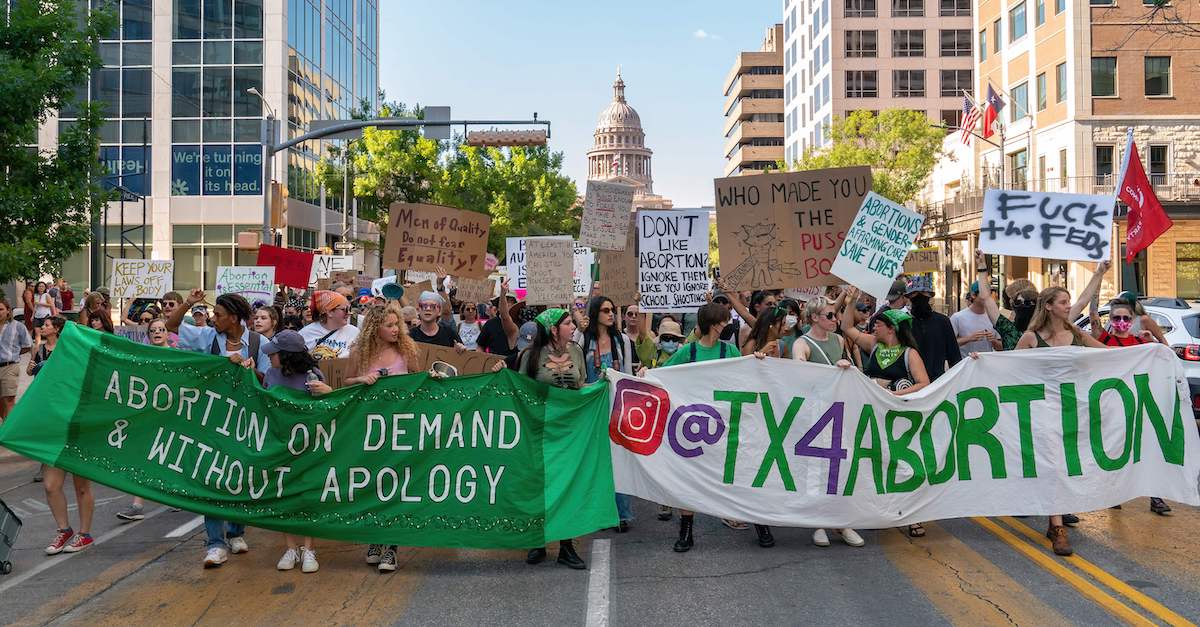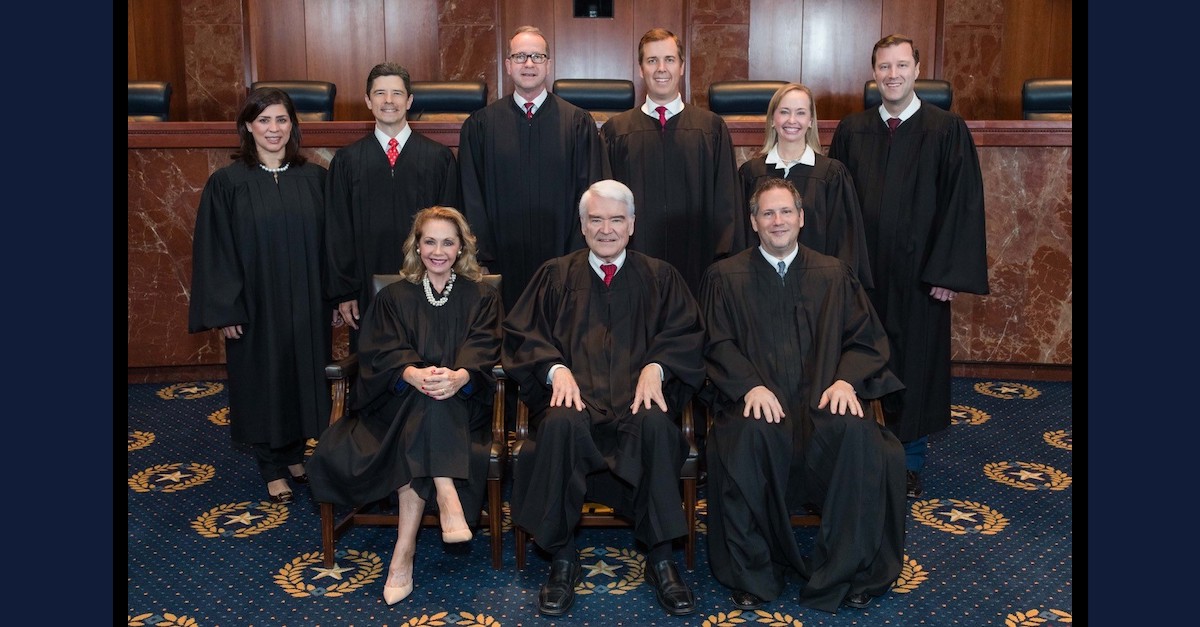
Abortion rights demonstrators gather near the State Capitol in Austin, Texas, June 25, 2022. (Photo by Suzanne Cordeiro/AFP via Getty Images.)
The Texas Supreme Court granted an emergency motion late Friday night to effectively reinstate the Lone Star State’s pre-Roe v. Wade abortion ban — a law that dates back to 1925 and which pro-choice advocates argued had long been considered “repealed” by several other courts.
The state high court’s decision is technically an emergency motion for temporary relief on a petition for a writ of mandamus. It is not a full opinion on the merits. It functionally lifted a temporary restraining order imposed by a lower court judge on June 28 — an order which for a few short days had blocked Texas officials from enforcing the state’s original abortion ban.
Texas has a so-called anti-abortion “Trigger Ban” on the books. It, and other similar laws in some other states, were passed with legislative hopes that the U.S. Supreme Court would overrule Roe v. Wade. Now that the Supreme Court has overruled Roe, those “Trigger Bans” are taking effect. In Texas, the “Trigger Ban” will take effect at the end of July.
Questions remained, however, about whether the state’s 1925 abortion ban could still be enforced. Judge Christine Weems of the 269th District Court in Harris County said on June 28 that it could not.
District Judge Weems issued a temporary restraining order “enjoining” a group of “defendants from enforcing Texas’s preexisting criminal prohibitions on abortion,” according to appellate paperwork filed by the office of Texas Attorney General Ken Paxton (R).
Weems ruled that the pre-Roe 1925 abortion ban was effectively “repealed” when the Supreme Court decided Roe v. Wade in 1973 and “may not be enforced consistent with the due process guaranteed by the Texas Constitution.”
Moreover, from Judge Weems:
The Court further finds that the threat of enforcement of Texas’s pre-Roe Ban creates a probable, irreparable, and imminent injury for which Plaintiffs and their physicians, nurses, pharmacists, and/or other staff are subjected to criminal liability or disciplinary action under the Pre-Roe Ban in the interim before [the newer “Trigger Ban”] goes into effect. Money damages are insufficient to remedy the injuries that will result if the Defendants are not enjoined from instituting criminal or disciplinary investigations or actions, against Plaintiffs, their physicians, nurses, pharmacists, and other staff under the Pre-Roe Ban. Conversely, Defendants will not be harmed if the Court restrains them and anyone in active concert and participation with them from enforcing the Pre-Roe Ban against Plaintiffs, their physicians, nurses, and other staff.
Weems said that granting the request merely would “preserve[] the status quo preceding this controversy,” which is something she said the Texas Supreme Court had previously instructed judges to do when considering a TRO.
“Unless Defendants are immediately restrained, Plaintiffs, their physicians, nurses, pharmacists, and other staff face an imminent threat of criminal liability and disciplinary action under the Pre-Roe Ban before notice can be given and a hearing is had on Plaintiffs’ Application for a Temporary Injunction and will suffer irreparable harm,” Weems continued. “Imminent judicial intervention is necessary to preserve Plaintiffs’ patients’ legal right to obtain, and Plaintiffs’ and their physicians’ legal right to provide, abortions in Texas until the Trigger Ban is in effect.”

Abortion rights demonstrators gather near the State Capitol in Austin, Texas, June 25, 2022. (Photo by Suzanne Cordeiro/AFP via Getty Images.)
Paxton’s office asked the Supreme Court to consider the issue immediately and said the truly irreparable harm would be suffered by the “unborn children’s lives lost in the interim.” From that request by the AG’s office:
This Court should issue an emergency stay and mandamus relief. Should Plaintiffs’ employees commit abortions while the TRO is in place, nothing will prevent prosecution once the TRO erroneously prohibiting enforcement is vacated. But prosecuting abortionists will not restore the unborn children’s lives lost in the interim. That irreparable loss necessitates this Court’s immediate action. Relators therefore respectfully request that this Court immediately stay the TRO and, absent a stay, issue mandamus relief by Wednesday, July 6.

Texas Attorney General Ken Paxton speaks during the Conservative Political Action Conference CPAC held at the Hilton Anatole on July 11, 2021 in Dallas, Texas. (Photo by Brandon Bell/Getty Images.)
Pro-choice advocates responded by arguing that Paxton’s office wasn’t even the correct agency at issue. Prosecutions are launched by local district attorneys, and the AG’s office only assists when requested, they argued.
Additionally, the pro-choice advocates, led by the ACLU and the Center for Reproductive Rights, said Weems was correct on the big-picture question (here, the “Relators” are Paxton’s office and those represented by that office):
Relators’ principal argument for such extraordinary relief is to allow Texans to be criminally prosecuted for violating antiquated statutes (1) that, if given effect, would invalidate a slew of later-enacted statutes expressly permitting and regulating abortion; (2) that, for this reason, have been held by the Fifth Circuit to have been repealed; and (3) that even the Texas statewide prosecutors’ association believes “cannot be reconciled” with later enacted laws and thus are causing “confusion.”
Setting aside the lack of merit to their argument, Relators have no authority to initiate criminal prosecutions. The district attorney (“DA”) defendants in this case are the parties with prosecutorial authority, while the Attorney General’s power is (as Relators admit) limited to assisting the DAs if they so request. Because Relators cannot initiate criminal prosecution, they are not aggrieved by the TRO to the extent it prohibits such prosecution. Relators have wholly failed to show they have standing to request a stay of the TRO’s bar against criminal prosecution.
Relators’ motion also defies the Texas Rules of Appellate Procedure. Relators misuse Rule 52.10(b) by seeking to alter, rather than preserve, the status quo. Here, it has been the status quo for five decades that the statutes at issue cannot be enforced against Real Parties in Interest (“Plaintiffs”). Preserving the status quo requires denying Relators’ motion, not granting it.

The Texas Supreme Court appears in an official portrait. Front row: Justice Debra Lehrmann, Chief Justice Nathan L. Hecht, and Justice Jeff Boyd. Back row: Justices Rebeca Aizpuru Huddle, Brett Busby, John Phillip Devine, Jimmy Blacklock, Jane Bland, and Evan A. Young.
The Texas Supreme Court, seizing upon the request from Paxton’s office days before the requested deadline, jettisoned the pro-choice logic late Friday with but a few brief words about scheduling and procedural matters:
1. Relators’ emergency motion for temporary relief, filed June 29, 2022, is granted in part. The temporary restraining order, dated June 28, 2022, in Cause No. 2022-38397, styled Whole Woman’s Health, et al. v. Ken Paxton, et al., in the 269th District Court of Harris County, Texas, is stayed as to Relators only pending further order of this Court.
2. The parties are directed to submit briefing by 5 p.m. July 7, 2022 regarding whether the 269th District Court of Harris County, Texas, has jurisdiction to enjoin the enforcement of a criminal statute. See State v. Morales, 869 S.W.3d 941 (Tex. 1994).
3. Real parties in interest are requested to respond to relators’ petition for writ of mandamus by 5 p.m. July 11, 2022.
4. This order does not preclude further proceedings in the court of appeals and district court, including proceedings to address the jurisdictional issue described in paragraph 2 above. The Court is confident that those courts will proceed expeditiously.
The Associated Press summarized the effects of the litigation as “whiplash” in nature due to the on-again (1925), off-gain (1973), presumptively on-again (June 24), off-again (June 28), on-again (July 1) posture of the 1925 Texas ban.
The AP also noted that the Texas Supreme Court was “stocked with nine Republican justices.”
Read the court’s Friday night order and the original petition and response below, in that order:
[Images as noted.]